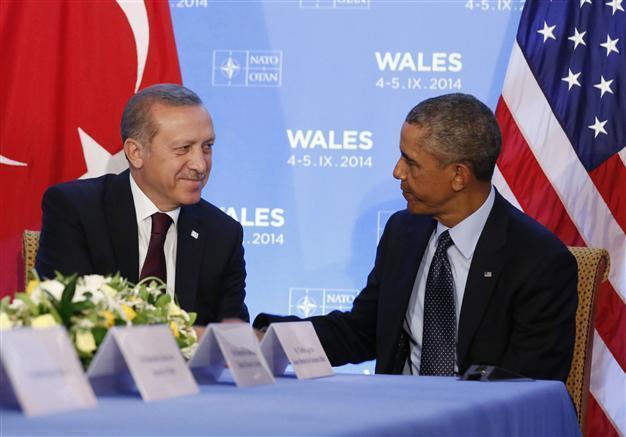Erdoğan discusses wiretapping, Islamic State threat with Obama
Akif Beki ABOARD TR-TUR

U.S. President Barack Obama hosts a bilateral meeting with Turkey's President Tayyip Erdogan during the NATO Summit at the Celtic Manor Resort in Newport, Wales September 5, 2014. REUTERS Photo
The presidents of NATO allies Turkey and the United States have agreed on a joint roadmap concerning “the parallel structure” which is subject to a widening inquiry into the alleged wiretapping of Turkish President Recep Tayyip Erdoğan, while discussing the threat posed by ISIL militants during NATO talks in Wales.President Recep Tayyip Erdoğan, speaking with a group of journalists on board the new presidential plane, registered as TR-TUR, during his return from the NATO summit, gave insight into the Sept. 5 meeting with U.S. President Barack Obama.
Erdoğan, meanwhile, also explained that he brought up allegations that Germany had been eavesdropping on Turkey for years during a bilateral meeting with Chancellor Angela Merkel.
“I also discussed the issue regarding ‘the parallel state’ structure in Turkey with Mr. President. We reminded him of the facts that particularly our intelligence organizations should be in closer contact on this issue and the need to focus on this structure which threatens our national security. Through efforts by our intelligence organizations and also by our foreign ministries, we will be following this process.
And I wish that developments in Turkey and there [in U.S.] may lead to the yielding of very different results,” Erdoğan said when asked about Obama’s response to his demand for the “deportation” of Pennsylvania-based Islamic scholar Fethullah Gülen.
Gülen and his followers have been accused of forming a “state within the state,” or “the parallel state,” mainly in the judiciary and the police. A gradually widening inquiry is underway into coup and spying allegations against the Gülen movement.
“At the moment, their approach is in the direction of our transfer of all documents and information we have,” Erdoğan said, when asked to elaborate on Obama’s approach to the demand.
“Hearing about this is something else and conveying this to them with its documents is something else. Of course, they have been hearing about all of these,” he said.
“Our friends will conduct necessary work and then we will convey these things to them,” he added.
Combatting ISIL
Although they discussed a wide range of issues during their 1.5-hour meeting such as Ukraine, Syria, Iraq, Libya, Egypt and Palestine, the U.S. quest to enlist allied support in fighting Islamic State or Iraq and the Levant militants in Iraq was apparently high on the agenda of the meeting between Erdoğan and Obama.
“They aim at forming a coalition with the participation of 11 NATO members and working together with this coalition. At the moment, I don’t know whether America had any meeting or not with these countries but we held our meeting there. Britain and France are already positive [on the idea], and Germany likewise. There is only Australia which is not a NATO member,” Erdoğan said.
“They are already asking and wishing neighboring countries to assume a place in such work. Other than that, there is a Sept. 11 deadline for the new Cabinet in Iraq to be announced. There is a [common] understanding to exert efforts so that this new Cabinet will be formed by Sept. 11. As Turkey, there are some tasks falling on our shoulders too. At the moment, both for Kurds and Sunnis and also for Turkmens, the problems are at the same point. Another issue on which emphasis was put is of course Syria. Turkey has been loaded with a big burden in this process. Some 1,250,000 refugees’ being hosted by Turkey is a very important situation. [Obama] voiced gratitude concerning the support for the transfer of humanitarian aid to the Free Syrian Army. With all of these things, the joint conviction is actually on ISIL. What can be done to ISIL? These things are in the final declaration,” he said, when asked whether Turkey was also asked to join the coalition.
The Turkish president said his country had already deported a number of people who wanted to transit from Turkey to Iraq and Syria in order to join the jihadist fighters.
“Nothing charging Turkey came in any of the sessions that I attended,” he said, when asked whether any leader reiterated what Western media had been reporting about the alleged negligence of Turkey in regards to preventing foreign militants from joining ISIL.
White House
A statement by the White House also confirmed how the ISIL issue was high on the agenda of the bilateral meeting between the leaders of the two allies.
“The president met with Turkish President Erdoğan today in Newport, Wales, where both leaders were attending the NATO summit. They exchanged views on how best to cooperate in the struggle against ISIL and violent extremism in Iraq and Syria, and on the need for strengthened measures against foreign fighters transiting to and from the battlefield,” said a Sept. 5 statement released by the National Security Council (NSC) of the U.S. administration.
“They discussed the urgent need for effective pressure and diplomacy aimed at bringing to an end the conflicts in Ukraine and Libya. The President and President Erdoğan also discussed the importance of building tolerant and inclusive societies and combating the scourge of anti-Semitism,” NSC spokesperson Caitlin Hayden said in the statement.
German eavesdropping
Erdoğan said he raised the claims that Germany had been spying on NATO ally Turkey during his bilateral meeting with Merkel.
“We decided jointly to task our intelligence organizations on this. She will also give the required instructions,” Erdoğan said, underlining that Merkel stated she would be following this process.
“Friendly countries should guard each other’s sensitivity over these issues,” he said.
Ankara has already warned Berlin that such practices would also harm the two countries’ cooperation in providing international security and stability.
















